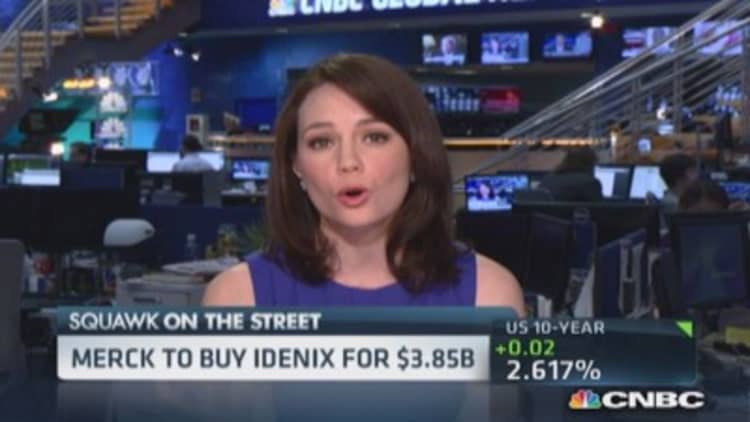
When your drug sets a record for the fastest launch in history, everyone wants a piece of it.
That's the case with Gilead Sciences' hepatitis C drug Sovaldi, which drew a record $2.27 billion in revenue in its first full quarter on the market. The Foster City, California-based company is competing with Merck, AbbVie, Bristol-Myers, Johnson & Johnson and others to treat an estimated 150 million people worldwide with drugs that are easier to take and have higher cure rates for hepatitis C.
Merck's $3.85 billion acquisition of Idenix, announced Monday, gives it additional experimental medicines to add to its arsenal. Idenix is developing a medicine in a class called "nucs," or nucleotide polymerase inhibitors, a valuable part of new treatment regimens.
Read MoreFor patients, costly hepatitis C cure is priceless
In announcing the deal, Merck also reinforced expectations for the size and durability of the hepatitis C market.
"They seem to endorse a 2018 worldwide hepatitis C sales estimate of more than $20 billion," ISI Group analyst Mark Schoenebaum wrote in a research note.
Gilead is still considered the leader, but its stock is down 3.9 percent. So what's up? (To get the latest quote for Gilead, click here.)
Analysts say there's more to Merck's interest in Idenix than its drug portfolio: intellectual property. Both Merck and Idenix have separately claimed they own the IP behind Gilead's Sovaldi. Individually, the claims may not have been as strong. Together, they hold more weight, said Robert W. Baird analyst Brian Skorney.
Read MoreHepatitis C drug costs beat alternative: Merck
"There's some value ascribed to the pipeline here, but no small part of it, in my mind, is the IP," Skorney said by telephone. The $24.50-a-share price is more than three-times Idenix's closing price Friday. "Probably greater than 50 percent of the deal is related to these patents."
Merck is likely to seek to consolidate its suits with Idenix's, Skorney said. That could put more pressure on Gilead to settle.
Read MoreWhy there's no end in sight for higher drug costs
"It certainly gives Merck more leverage with Gilead," he said. "It makes all the IP [challenges] go away if Gilead were to settle, instead of having to negotiate with two separate parties."
Trials around the intellectual property could take years to play out, but a settlement, Skorney said, could happen any time.
—By CNBC's Meg Tirrell

